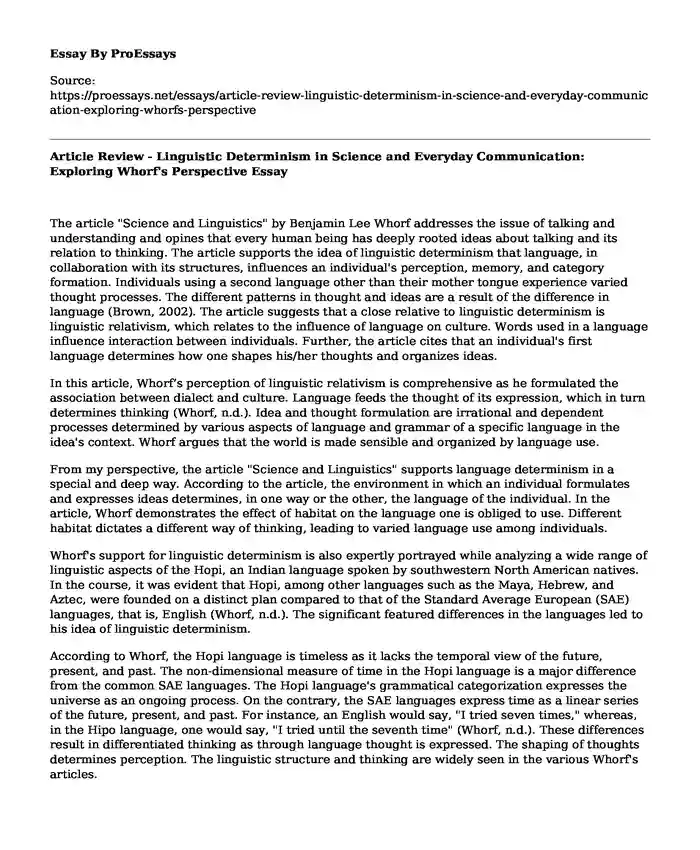The article "Science and Linguistics" by Benjamin Lee Whorf addresses the issue of talking and understanding and opines that every human being has deeply rooted ideas about talking and its relation to thinking. The article supports the idea of linguistic determinism that language, in collaboration with its structures, influences an individual's perception, memory, and category formation. Individuals using a second language other than their mother tongue experience varied thought processes. The different patterns in thought and ideas are a result of the difference in language (Brown, 2002). The article suggests that a close relative to linguistic determinism is linguistic relativism, which relates to the influence of language on culture. Words used in a language influence interaction between individuals. Further, the article cites that an individual's first language determines how one shapes his/her thoughts and organizes ideas.
In this article, Whorf’s perception of linguistic relativism is comprehensive as he formulated the association between dialect and culture. Language feeds the thought of its expression, which in turn determines thinking (Whorf, n.d.). Idea and thought formulation are irrational and dependent processes determined by various aspects of language and grammar of a specific language in the idea's context. Whorf argues that the world is made sensible and organized by language use.
From my perspective, the article "Science and Linguistics" supports language determinism in a special and deep way. According to the article, the environment in which an individual formulates and expresses ideas determines, in one way or the other, the language of the individual. In the article, Whorf demonstrates the effect of habitat on the language one is obliged to use. Different habitat dictates a different way of thinking, leading to varied language use among individuals.
Whorf's support for linguistic determinism is also expertly portrayed while analyzing a wide range of linguistic aspects of the Hopi, an Indian language spoken by southwestern North American natives. In the course, it was evident that Hopi, among other languages such as the Maya, Hebrew, and Aztec, were founded on a distinct plan compared to that of the Standard Average European (SAE) languages, that is, English (Whorf, n.d.). The significant featured differences in the languages led to his idea of linguistic determinism.
According to Whorf, the Hopi language is timeless as it lacks the temporal view of the future, present, and past. The non-dimensional measure of time in the Hopi language is a major difference from the common SAE languages. The Hopi language's grammatical categorization expresses the universe as an ongoing process. On the contrary, the SAE languages express time as a linear series of the future, present, and past. For instance, an English would say, "I tried seven times," whereas, in the Hipo language, one would say, "I tried until the seventh time" (Whorf, n.d.). These differences result in differentiated thinking as through language thought is expressed. The shaping of thoughts determines perception. The linguistic structure and thinking are widely seen in the various Whorf's articles.
Syntax and Semantics
The grammatical structure of a text is called syntax, whereas the meaning or the message being conveyed is called semantics (Perner et al., 2003). A sentence can be syntactically correct but semantically wrong. In this context, misunderstanding can be seen as the listeners' inability the right interpretation of all the possible interpretations. Differences in an individual's first language have been an issue when analyzing both syntax and semantics as the mother tongue is always prevalent. In life, I have encountered different syntactic or semantic disparities leading to misunderstandings.
In one of the uncountable instances, a statement was raised, which led to syntactical ambiguity. The lead teacher said that she would survey the institution on Friday. In this concept, the statement was interpreted that the survey would take place on Friday, while others interpreted that the statement was released on Friday. In another context, a court report stated that “the suspect confronted the kid with a knife.” The statement did not select words properly or the sentence structure and explain whether the kid had the knife or the suspect.
Lastly, in a dialogue, a student said that “visiting friends could be boring.” The syntax in the statement is correct but led to confusion. The act of visiting your friends is boring might be the meaning of the statement. Individual friends are generally boring once they visit you might be another meaning of the statement.
Conclusion
The syntax in a sentence can be correct, but the semantics are wrong. In other instances, both syntax and semantics can be right, but a statement can lead to misunderstandings. Different interpreters combine both semantic and syntactic cues in sentence interpretation. The interpretation of a single unit may differ from one language to another. Thus, the interpretation of language is best explained by language determinism.
References
Brown, R. W. (2002). Linguistic determinism and the part of speech. The Journal of Abnormal and Social Psychology, 55(1), 1.
Perner, J., Sprung, M., Zauner, P., & Haider, H. (2003). Want that is understood well before say that, think that, and false belief: A test of de Villiers's linguistic determinism on German–speaking children. Child development, 74(1), 179-188.
Whorf, B. (n.d.). Science and Linguistics. https://web.mit.edu/allanmc/www/whorf.scienceandlinguistics.pdf
Cite this page
Article Review - Linguistic Determinism in Science and Everyday Communication: Exploring Whorf's Perspective. (2024, Jan 14). Retrieved from https://proessays.net/essays/article-review-linguistic-determinism-in-science-and-everyday-communication-exploring-whorfs-perspective
If you are the original author of this essay and no longer wish to have it published on the ProEssays website, please click below to request its removal:
- Essay Sample on Racial and Cultural Discrimination of Women in Online Dating
- Statement of Purpose for the University of Minnesota
- Direct TV Advert Paper Example
- Essay Example on the USA: A Rich Culture Marred by Racial Discrimination and Stereotyping
- Female Pleasure: A Key Component in a Healthy Marriage - Essay Sample
- Essay Example on Chemistry Essential for Human Existence: Sunita Bhargava
- Essay Sample on Grieving Death: Moving On After Loss of a Loved One







